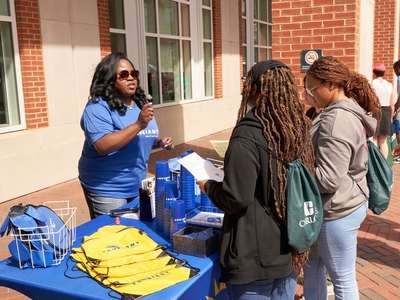Truliant Federal Credit Union, in partnership with Niner Finance at the University of North Carolina at Charlotte, has completed the first year of a new program aimed at helping students develop better financial habits.
The Rainy Day Savings Program for UNC Charlotte students was implemented for the 2023-24 academic year by Niner Finances and Truliant. The goal was to help students build an emergency fund and earn incentives for incorporating good financial habits. Truliant offered financial support, and its own financial education expertise.
The Niner Finance program is now one of three formalized departments within the UNC system that facilitate financial education for students. The other two schools are Eastern Carolina University and UNC-Chapel Hill. While high school financial education has received significant attention, colleges are now stepping up to address this crucial need.
The term “rainy day savings” refers to setting aside money for unexpected expenses or emergencies. The Rainy Day program is the first of its kind at UNC Charlotte.
“Truliant has a great deal of personal finance expertise and we’ve found that our approaches to financial education are closely aligned with each other,” Nicole Benford, Niner Finances program director, said. “We teach the facts of financial literacy, but also the psychology behind our behaviors and how to change them. Learning that Truliant has operated financial education programs tailored to specific audiences for many years makes this a natural and fulfilling partnership.”
Niner Finances is a campus department within Student Affairs that was launched in 2021 to teach students the critical life skill of money management through programming, resources, education and one on one coaching. They aim to have students graduate from college with more money saved in an emergency fund than they have in credit card debt.
In its inaugural year, the Rainy Day program was open to Pell Eligible students from Truliant’s Charlotte regional membership area.
Under the Rainy Day program, students receive incremental $25 incentives based on positive financial behaviors, for up to a total of $100. These behaviors include activities like completing the FAFSA federal financial-aid application, participating in a financial coaching session, workshops with Niner Finances, maintaining a balance of $475 for at least a month and setting up a minimum recurring transfer of at least $5 from their checking account to their rainy day savings account for a minimum of three months.
For the 2024-25 term – the second year of the program – the incremental incentive amount will increase to $50 based on positive financial behaviors.
According to Gerard Covarrubias, a UNC Charlotte student, Rainy Day Savings helped him get more involved with developing good financial habits through the Niner Finance program.
“It has helped me be more prepared,” Covarrubias said. “I talked with them monthly about finances. They helped me set a budget; to record my spending and how much I’m making. They advised me on how to spend if I don’t make as much in a month, or if I make a little more.”
Students also had the opportunity to earn bonuses for further demonstrating good financial habits. Participants submitted information to demonstrate that they had completed financial tasks and that they had set up a direct deposit to receive incentive payments. The pilot cohort consisted of 27 students. One goal was to control the number of students to learn the best ways to create a more viable, long-term program.
“This year gave us a chance to test the feasibility of a new program and learn how participants would respond, and what we can achieve,” Angela Best, director, corporate social responsibility, community engagement and education at Truliant, said. “We wanted to gauge genuine interest and get a clearer picture for the future.”
“By the end of April, our students had earned $1,575 in incentives,” Benford said. “Truliant made an investment in our students without the expectation of gaining customers. I think that’s very generous. Next year, we hope to have 100 students and to increase the incentives.”


